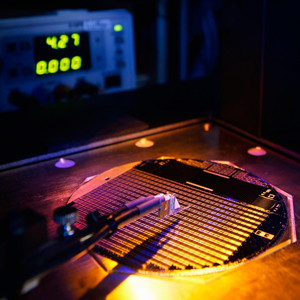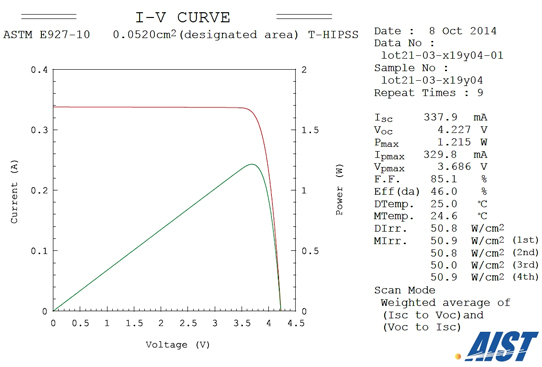- News
1 December 2014
Fraunhofer ISE, Soitec and Leti raise solar cell efficiency record from 44.7% to 46%
Bernin-based Soitec (which makes engineered substrates and CPV systems) and Grenoble-based micro/nanotechnology R&D center CEA-Leti of France, together with the Fraunhofer Institute for Solar Energy Systems ISE of Freiburg, Germany, have developed a multi-junction solar cell that has raised the record for the direct conversion of sunlight into electricity from 44.7% (set by Fraunhofer ISE, Soitec, CEA-Leti and Helmholtz Zentrum Berlin in September 2013) to 46%.
 Picture: Record solar cell on 100mm wafer, yielding about 500 concentrator solar cell devices. ©Fraunhofer ISE/Photo Alexander Wekkeli
Picture: Record solar cell on 100mm wafer, yielding about 500 concentrator solar cell devices. ©Fraunhofer ISE/Photo Alexander Wekkeli
Based on III-V compound semiconductor materials, multi-junction cells are used in concentrator photovoltaic (CPV) systems to produce low-cost electricity in photovoltaic power plants, in regions with a large amount of direct solar radiation.
The record cell is a four-junction cell, and each of its sub-cells converts a quarter of the incoming photons in the wavelength range 300-1750nm into electricity. When applied in CPV systems, a very small cell is used with a Fresnel lens, which concentrates the sunlight onto the cell. The new record efficiency was measured at a concentration of 508 suns and has been confirmed by the Japanese AIST (National Institute of Advanced Industrial Science and Technology), one of the leading centers for independent verification of solar cell performance results under standard testing conditions.

Picture: I-V characteristics of new four-junction solar cell with 46% efficiency at 50.8W/cm2, corresponding to a concentration ratio of 508 times the solar AM1.5d (ASTM E927-10) spectrum.
A special challenge that had to be met by the cell is the exact distribution of the photons between the four sub-cells. This was achieved by the precise tuning of the composition and thicknesses of each layer inside the cell structure. “This is a major milestone for our French-German collaboration,” says Dr Frank Dimroth, project manager for the cell development at Fraunhofer ISE. “CPV is the most efficient solar technology today and suitable for all countries with high direct normal irradiance,” he adds.
“It confirms we made the right technology choice when we decided to develop this four-junction solar cell and clearly indicates that we can demonstrate 50% efficiency in the near future,” beleives Jocelyne Wasselin, VP Solar Cell Product Development for Soitec. “To produce this new generation of solar cells, we have already installed a line in France, ” she adds. “It uses our bonding and layer-transfer technologies and already employs more than 25 engineers and technicians. This successful cooperation with our French and German partners will drive further increase of CPV technology efficiency and competitiveness.”
Fraunhofer ISE, Soitec, Leti and Helmholtz Center achieve record 44.7% solar cell efficiency
Fraunhofer ISE and Soitec achieve 43.6% efficiency with four-junction CPV cell
Fraunhofer ISE raises multi-junction solar cell efficiency record to 41.1%
Fraunhofer ISE Leti Soitec CPV Helmholtz


